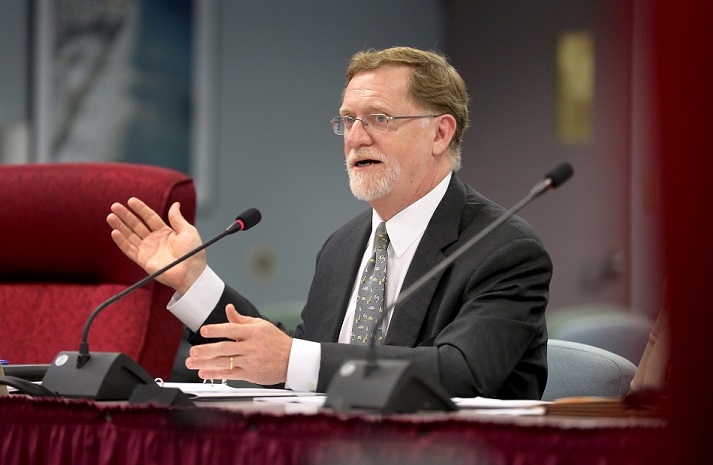
Broward County Inspector General John Scott (Broward Office of the Inspector General)
By Kevin Deutsch
Broward’s top watchdog identified the “potential for fraud, waste, and abuse” in the receipt-free expense accounts created for Tamarac city commissioners, but he did not substantiate allegations of misconduct and abuse related to the new expense law, according to the watchdog’s memorandum.
Tamarac commissioners changed the city code last year to give themselves the annual $15,000 local travel allowance, but the legal change did not include any requirement they keep or show receipts for that travel, spurring accusations of corrupt self-dealing, according to the April 29 memo by Broward County Inspector General John Scott.
If a commission member were to opt-in to the policy, the travel allowance, when funded, would pay them $15,000 each year for travel within 100 miles of Tamarac City Hall. That’s in addition to their approximately $50,000 annual salary, $8,400 annual car allowance, $25,000 annual “initiative individual expense account,” and their share of the commission’s separate, annual $55,000 out-of-town travel expense reimbursement fund, Scott wrote.
The OIG’s investigation did find any city employees or commission members “engaged in misconduct or abuse, and did not substantiate the allegations” of misconduct by the elected officials, wrote Scott, Broward’s first Inspector General.
“We did, however, identify the potential for fraud, waste, and abuse in the application of the city’s newly enacted ordinance.”
“Without the need for receipts or any documentation to show how much money commission members spend and what they spend it on, the city and the public would have no idea whether taxpayer funds were spent to fulfill commission members’ public duties or for any public purpose,” wrote Scott, who was appointed to his newly created office in 2011. “Therefore, $75,000 of taxpayer money could be used for purposes other than what it was intended.”
In June, the commission voted to remove money in the budget for the local travel allowance, Scott wrote, but “there is nothing in place that would prevent it from funding this line item in the future, either by budget amendment or by the budget process for an upcoming fiscal year.
“In order to mitigate the risk for fraud, waste, and abuse in the future, it would behoove the city to take preventative measures now. For instance, it could develop and train staff and officials on a more clear, objective, and comprehensive travel reimbursement policy, considering past misunderstandings and conflicts.”
Scott said that the city could amend its code to require receipts and proof of travel from any commission member who opts in to the policy to prevent abuse. Among other possible reforms, it could vote to require the city to follow the reimbursement rules for government agencies listed in state law.
For its probe, the OIG reviewed city e-mails, interoffice memoranda, the city’s travel policy, city commission meeting minutes and transcripts, ordinances, supporting travel documentation, budget amendment proposals, and adopted budgets, according to Scott.
Investigators also interviewed Tamarac’s director of financial services, currently listed in city records as Mark Mason.
The travel expense accounts were created, city officials said, “in lieu of reimbursing [the commission] for local travel expenses they incur within the scope of their official duties,” according to the memo.
If a commission member were to opt in to the policy, no receipts or administrative approval would be necessary for local travel, Scott wrote. If a commission member were to decline to opt-in, then the existing city code would still require them to submit receipts for reimbursement.
There was no public comment about the change to city law before the ordinance’s Feb. 24, 2021 passage, and Scott wrote no discussion by the commission.
Scott wrote that only one commissioner opted in for the local travel allowance, citing city records.
After news reports revealed the new expense accounts, that same commission member emailed the city manager to say that, “after having heard from so many residents and to allow for further discussion, he wanted city employees to suspend processing his new local travel allowance paperwork.”
“He further stated that the item needed to go back to the “drawing board” and asked the city manager to confirm the change promptly,” Scott wrote.
The commissioner is not identified in Scott’s memo.
A flurry of moves by the commission at a June meeting left their travel expense accounts without funding, but city code still states that “if a member of the commission were to request the $15,000 allowance for local travel, then receipts ‘shall not be required for any expense,’” Scott wrote.
At that same meeting, commissioners removed several related items from consideration that would have provided $277,500 in benefits: $37,500 for local travel allowance, $75,000 for additional legislative aides, $50,000 for commission’s office renovation, $50,000 for commission media outreach, $15,000 for office furniture, and $50,000 for support of the commission’s initiatives, the memo states.
According to his official biography page, Scott oversees investigations of misconduct, including fraud, corruption, abuse and ethics violations, and gross mismanagement in government. 20220429OIG21009MClosingMemoradum
Got News? Send it to Tamarac Talk. Don’t miss reading Margate Talk, Coral Springs Talk, and Parkland Talk,
Author Profile

Latest entries
 NewsJanuary 30, 2026House Ethics Report Details 27 Alleged Violations Against Congresswoman Representing Tamarac
NewsJanuary 30, 2026House Ethics Report Details 27 Alleged Violations Against Congresswoman Representing Tamarac NewsJanuary 28, 2026Woman Shot in Tamarac, Airlifted to Hospital
NewsJanuary 28, 2026Woman Shot in Tamarac, Airlifted to Hospital NewsJanuary 19, 2026Lori Alhadeff Won’t Seek Reelection, Endorses Sharry Kimmel to Succeed Her on Broward School Board
NewsJanuary 19, 2026Lori Alhadeff Won’t Seek Reelection, Endorses Sharry Kimmel to Succeed Her on Broward School Board NewsDecember 26, 2025Tamarac Resident and Haitian TV Star Carel Pedre Jailed at ‘Alligator Alcatraz’ After Battery Arrest
NewsDecember 26, 2025Tamarac Resident and Haitian TV Star Carel Pedre Jailed at ‘Alligator Alcatraz’ After Battery Arrest






